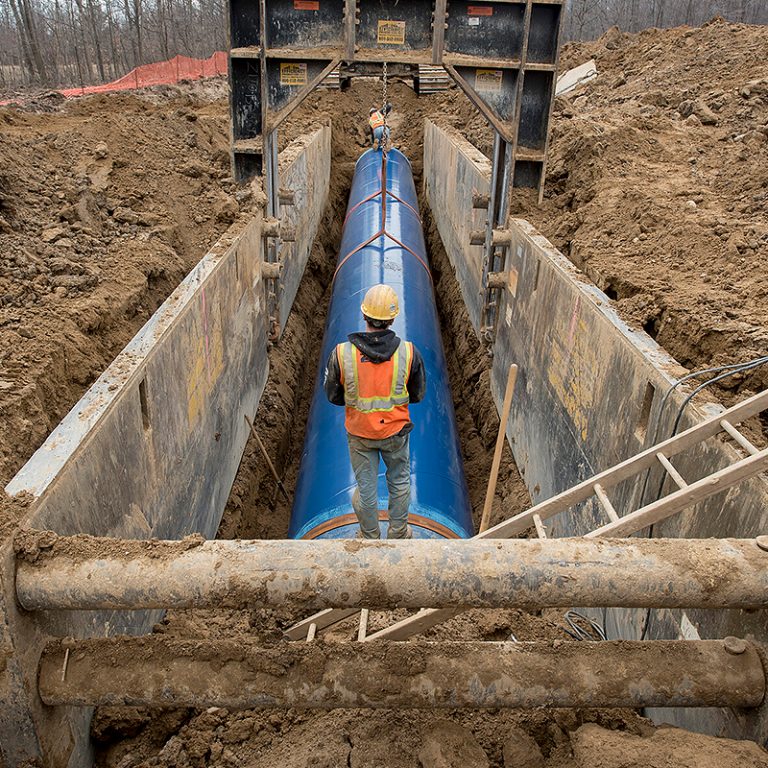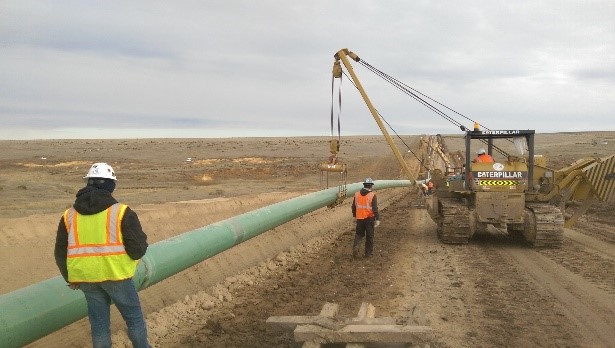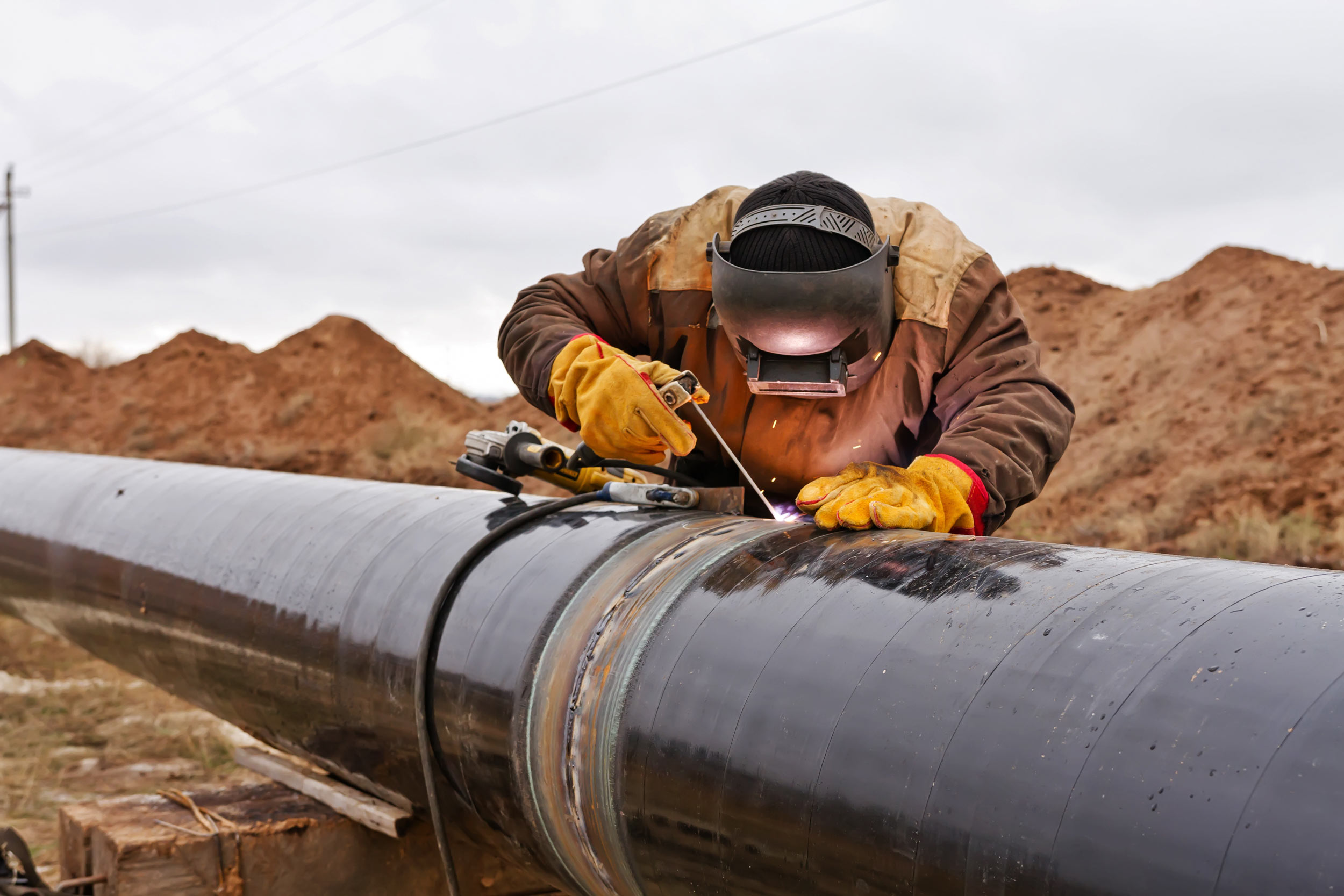Pipeline Construction Excellence’s Impact on Cost-Efficient Delivery Systems
Wiki Article
Why Pipeline Construction Is Vital for Energy Facilities Development
Pipeline construction plays a vital role in the growth of power facilities, functioning as the foundation for the transportation of essential sources like oil and gas. This intricate network not only facilitates reliable distribution however additionally reinforces financial growth through job creation and local investment. Furthermore, improvements in security modern technologies are resolving environmental issues, placing pipelines as a foundation of sustainable power approaches. The intricacies bordering pipeline tasks increase essential inquiries about governing structures and their lasting influence on communities and ecological communities. Discovering these dimensions exposes a diverse story that necessitates careful consideration.Role of Pipelines in Energy Supply
The important duty of pipelines in energy supply can not be overstated, as they function as the backbone of modern power infrastructure. Pipelines are crucial for the efficient transport of different forms of power, consisting of oil, natural gas, and improved items. They promote the motion of these sources from extraction websites to refineries and distribution centers, making sure that power reaches consumers in a prompt manner.The construction of pipelines entails precise preparation and adherence to regulatory criteria, reflecting the intricacies of the energy market and ecological factors to consider. Efficient pipe networks are developed to reduce transportation times, lower prices, and improve security, while likewise resolving prospective environmental impacts. The ability to transfer large quantities of energy over cross countries makes pipelines a preferred choice for energy companies aiming to optimize their supply chains.Moreover, pipelines add to power security by expanding supply courses and sources. As worldwide power needs fluctuate, pipelines make it possible for areas to access various energy supplies, mitigating risks connected with reliance on solitary resources. This diversity promotes competitive rates and maintains markets, which is vital in a progressively interconnected worldwide economy.In enhancement to their logistical benefits, pipelines sustain neighborhood economic situations by developing tasks throughout construction and upkeep phases. The existence of a robust pipe facilities also attracts financial investments in energy tasks, even more enhancing regional growth. Eventually, pipelines are crucial to the energy industry, giving a reliable and reliable ways of transportation that underpins economic development and sustainability.
Advantages of Reliable Transportation
Efficient transport through pipe systems supplies substantial benefits, including reduced transport expenses and enhanced shipment rate. These advantages not just improve the total business economics of power circulation yet likewise play an essential function in lessening the environmental impact connected with power transportation. As power needs continue to climb, the importance of optimizing transportation techniques comes to be increasingly evident.
Reduced Transportation Costs
Reduced transport prices represent a remarkable benefit in the domain name of energy framework development. The construction of pipelines supplies a much more economically practical means of transporting power sources compared to alternate techniques such as trucking or rail transport. Pipelines, as soon as developed, permit for the continuous circulation of oil, gas, and other products over lengthy distances with marginal operational costs.One of the main reasons for reduced transportation expenditures is the effectiveness of pipe systems. They can transfer large volumes of products concurrently, consequently spreading out taken care of costs over a better quantity of item. This bulk transportation ability significantly lowers the price each, making power resources extra economical for consumers and services alike.Additionally, pipelines minimize the threats and costs linked with handling and keeping volatile materials. Unlike rail or roadway transportation, which can sustain hold-ups and damage, pipelines offer a more secure and a lot more consistent technique of energy conveyance. Subsequently, this dependability enhances the economic expediency of power projects, enabling for far better rates frameworks in open markets. Eventually, decreased transportation prices promote an even more lasting power industry, promoting broader access and encouraging financial investment in further advancement.Enhanced Delivery Rate
Pipelines greatly boost shipment rate in energy transportation, providing an important advantage over traditional methods such as trucking or rail systems. The continuous flow of materials via pipelines enables for a stable and reliable transportation procedure, lessening delays related to loading and discharging. This consistent movement is particularly essential for energy resources, where need can fluctuate rapidly.Moreover, pipelines can operate around the clock, untouched by website traffic conditions or weather-related disruptions that can impede road or rail transportation. This integrity assures that power products get to customers promptly, supporting operational needs and reinforcing financial stability. Additionally, the scalability of pipeline systems facilitates the handling of huge volumes of energy, which is critical for fulfilling the growing requirements of industries and household sectors.Furthermore, the combination of innovative surveillance and control modern technologies in pipe systems improves the distribution procedure. These developments permit real-time tracking of circulation prices and system pressures, ensuring that any type of prospective issues are resolved promptly. On the whole, the improved shipment rate offered by pipelines is a significant element in enhancing power facilities and ensuring that supply chains remain durable and responsive to market needs.Ecological Impact Considerations
The advantages of speedy energy transportation expand beyond logistical benefits; they additionally encompass substantial ecological considerations. Efficient pipe systems enable the transportation of energy sources with very little disturbance to ecological communities compared to different approaches such as truck or rail transportation. Pipelines can help with the movement of oil, gas, and various other materials in a highly concentrated fashion, which minimizes the carbon footprint connected with energy distribution.Moreover, pipelines are created with innovative safety and tracking modern technologies that significantly lower the risk of spills and leaks. An efficient pipe framework reduces the requirement for constant transportation tasks, which can cause minimized greenhouse gas exhausts over time (Permian Basin Pipeline Solutions). The capability to deliver power resources directly to customers lowers reliance on more polluting transport approaches, better benefiting air quality.In enhancement, calculated pipeline placement can assist maintain sensitive environments by adhering to existing hallways, therefore reducing the influence on wildlife and all-natural landscapes. On the whole, the construction of pipelines not only supports energy framework development however likewise gives an ecologically liable means of moving energy, adding to a more sustainable futureEconomic Influence of Pipeline Projects
The economic influence of pipeline tasks expands past simple transport performance, significantly affecting regional and regional economic situations. These efforts create work opportunities during both construction and recurring operations, cultivating neighborhood advancement (Pipeline Construction Excellence). Additionally, the excitement of economic development through boosted financial investment and facilities improvement is a vital benefit of pipe constructionTask Production Opportunities
While energy facilities tasks frequently encounter scrutiny, they offer substantial job production chances that can positively influence regional economic climates. Pipeline construction jobs call for a diverse series of knowledgeable labor, consisting of engineers, job supervisors, and specialized technicians, along with unskilled laborers for various roles. This multifaceted demand for labor can lead to the creation of hundreds of tasks during the construction stage and frequently causes lasting employment opportunities once the facilities is operational.In addition to guide work, pipeline tasks boost neighborhood economies by generating Texas Pipeline Construction Excellence secondary job chances in sectors such as transport, production, and friendliness. Local organizations take advantage of raised need for items and services, adding to general financial health. Furthermore, the influx of workers can lead to increased tax obligation revenues for city governments, which can be reinvested in social work and infrastructure.Moreover, pipe construction tasks often prioritize employing regional employees, promoting a feeling of community investment and support. By bridging the gap in between energy supply and demand, these tasks not only boost power safety and security yet additionally offer as catalysts for economic growth, strengthening the value of pipe construction in work production efforts.Economic Development Stimulation
Pipeline tasks act as an effective financial development stimulus, driving substantial investments right into neighborhood and local economic climates. The construction and operation of pipelines develop a surge impact, producing demand for materials, equipment, and solutions (Permian Basin Pipeline Solutions). This increase of capital sustains regional organizations, from producing to hospitality, cultivating a durable financial environment.Moreover, these jobs generate substantial tax profits for communities and states, which can be reinvested in public solutions, facilities renovations, and community growth campaigns. The financial benefits prolong beyond immediate task production, as experienced labor is frequently required for ongoing maintenance and operations, making sure long-term employment opportunities.Additionally, the improved energy facilities assists in the reliable transportation of resources, possibly lowering power prices for consumers and services alike. By enhancing energy access, pipelines can attract brand-new industries and boost growth in existing fields, adding to total economic diversityEcological Factors To Consider and Advancements
Balancing power requires with ecological honesty ends up being significantly critical as pipeline construction broadens. The pursuit of effective energy transportation have to represent environmental impacts, requiring ingenious techniques and technologies that minimize eco-friendly interruption. Modern pipeline tasks are significantly integrating sophisticated ecological evaluations at every stage, making certain that prospective dangers are identified and reduced early in the preparation process.One remarkable development in this field is the fostering of trenchless technology, which enables the setup of pipelines without substantial surface area disturbance. This approach minimizes habitat fragmentation, maintains existing ecosystems, and minimizes the carbon impact connected with typical excavation methods. Additionally, real-time surveillance systems furnished with sensing units allow drivers to discover leaks or environmental modifications promptly, therefore assisting in timely feedbacks to possible hazards.Moreover, the unification of ecologically friendly materials and construction strategies is getting grip. Biodegradable drilling liquids and corrosion-resistant coverings can considerably lower the ecological footprint of pipeline projects. Companies are also committing to bring back environments post-construction, making use of native plant types to aid in community recovery.Collaboration with environmental firms and neighborhood areas is crucial - Pipeline Construction Excellence. Involving stakeholders in the decision-making procedure promotes transparency and promotes lasting practices, guaranteeing that power framework development aligns with ecological stewardshipChallenges in Pipeline Construction
In the middle of the growing need for energy infrastructure, different challenges complicate the construction of pipelines. Among the key problems is the geographical irregularity of pipe routes, which can pass through varied landscapes, consisting of mountains, rivers, and urban locations. Each setting requires customized engineering services to deal with ecological defense, geological stability, and logistical constraints.Additionally, the general public understanding of pipeline projects commonly positions a significant difficulty. Regional communities might reveal worries relating to prospective environmental influences, safety threats, and disturbance during construction. This opposition can result in delays, boosted expenses, and the requirement for extensive community involvement strategies to cultivate acceptance.Moreover, labor lacks in proficient professions even more make complex pipeline construction initiatives. As the demand for power infrastructure expands, the schedule of knowledgeable workers reduces, which can bring about task hold-ups and boosted labor costs. The pipe industry have to purchase labor force advancement efforts to grow a competent labor force with the ability of meeting the advancing demands.Safety continues to be a paramount worry throughout the construction process. The industry faces the obstacle of guaranteeing that all safety and security protocols are complied with, as even small lapses can cause significant mishaps. This requires rigorous training and oversight to maintain operational integrity.Lastly, rising and fall product prices can influence task spending plans and timelines. The need for high-quality materials, combined with market volatility, requires careful financial preparation and risk reduction approaches to maintain tasks on basics track. Resolving these challenges is necessary for the effective and efficient construction of pipelines as part of a robust power infrastructure.Regulatory Framework and Conformity
The governing structure regulating pipe construction is intricate and complex, calling for conformity with a variety of government, state, and regional policies. At the federal level, firms such as the Federal Power Regulatory Commission (FERC) and the Pipeline and Hazardous Materials Security Administration (PHMSA) play vital roles in looking after pipeline jobs. FERC regulates the transport of gas and oil, authorizing projects based on financial demand and public rate of interest, while PHMSA concentrates on security criteria and the integrity of pipe operations.State regulations can differ considerably, with private states imposing their very own permitting processes, safety and security laws, and ecological analyses. For example, state utility payments might require additional scrutiny of recommended courses to ensure marginal interruption to areas and ecological communities. Conformity with the National Environmental Policy Act (NEPA) is additionally required, mandating extensive ecological effect analyses prior to task approval.Local regulations may better complicate the conformity landscape, as towns often have specific zoning legislations, land usage regulations, and neighborhood interaction requirements. Involving with regional stakeholders is not only a regulatory requirement however also a finest technique to assist in smoother task execution.Moreover, the regulative landscape is continuously evolving, affected by public view, technological improvements, and environmental plans, requiring constant alertness from pipeline drivers. Guiding through this complex regulatory structure is important for verifying that pipe construction tasks are not just legally compliant however additionally socially responsible and environmentally sustainable, therefore adding to the total efficiency of energy facilities advancement.
Future Patterns in Pipeline Infrastructure
A significant change is underway in pipe facilities, driven by innovations in technology, advancing energy demands, and increasing ecological awareness. As the worldwide energy landscape shifts towards sustainable resources, pipe systems are adjusting to accommodate diverse energy kinds, including natural gas and biofuels, while additionally integrating much more sophisticated surveillance and security technologies.One significant trend is the unification of digital services, such as Net of Things (IoT) devices and expert system (AI), which improve real-time tracking and predictive maintenance abilities. These technologies not only enhance operational effectiveness yet likewise noticeably minimize the risk of leaks and crashes, ensuring higher environmental protection. Additionally, making use of sophisticated products, such as composite pipelines, is acquiring grip due to their resilience and resistance to deterioration, further extending the life-span of pipeline systems.Moreover, the focus on sustainability is prompting the growth visit the website of greener construction practices. Techniques such as trenchless modern technology lessen land disruption and ecological influence, aligning pipeline jobs with contemporary ecological standards. Furthermore, regulatory frameworks are progressing to advertise transparency and liability in pipeline procedures, making certain stakeholders are a lot more informed about potential dangers and advantages.Often Asked Questions
Just How Do Pipelines Contrast to Various Other Transport Approaches for Energy Resources?
Pipelines supply a cost-efficient, efficient, and ecologically pleasant approach for carrying power sources compared to options like trucks and trains, which usually sustain greater operational prices, greater land usage, and increased greenhouse gas emissions. - Pipeline Construction Authority
What Products Are Generally Utilized in Pipeline Construction?
Typical products used in pipe construction include carbon steel, stainless-steel, and plastic compounds. These products are chosen for their strength, toughness, corrosion resistance, and viability for various ecological problems and sorts of transported energy resources.

The length of time Does It Typically Require To Develop a Pipeline?
The duration for pipeline construction differs substantially based upon aspects such as length, terrain, and regulative demands. Usually, it can range from numerous months to a couple of years, depending upon task complexity and ecological considerations.
That Are the Trick Stakeholders in Pipeline Projects?
Trick stakeholders in pipe jobs consist of federal government companies, governing bodies, power firms, ecological organizations, local communities, and landowners - Professional Oilfield Services Texas. Each team plays a crucial duty in planning, allowing, construction, and ongoing procedures of pipeline frameworkWhat Are the Key Security Steps During Pipeline Construction?
Throughout pipeline construction, main security procedures include rigorous site assessments, adherence to regulative requirements, complete training for workers, using personal protective tools, and continual tracking of ecological conditions to alleviate threats and ensure operational security.Report this wiki page